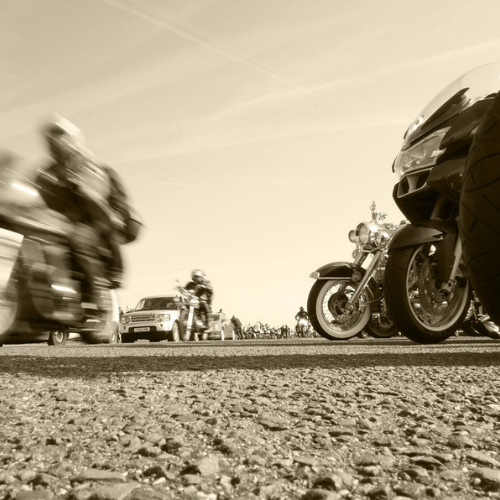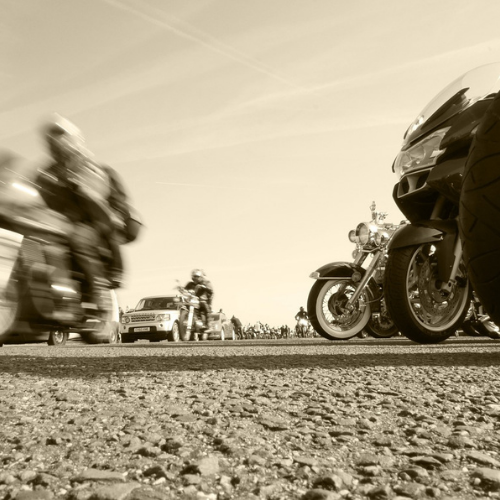
Barry Betha: Overheated Biker Collapses
Our Wilderness First Responder graduate Barry Betha also took our Heat Emergencies webinar, and afterwards shared the following story with Dr. Bonthius.
Barry: “I had just attended this webinar a few weeks ago, and experienced a heat-related incident in the mountains last Sunday. An on-scene physician and I were having disagreements about treatment of the patient. In the end I deferred since he was the higher medical authority. Two days later after talking to the patient from the hospital, seems I was right about his diagnosis and my planned treatment would have been correct.
Dr. Bonthius: I was super-interested, so I asked him more about what had happened – his story:
Barry: So I work for a motorcycle adventure company as an instructor here in Colorado. We train people how to ride big adventure bikes off-road and we also lead a lot of back country off-road tours, both in and out of the country. These bikes can weigh up to 500+ pounds and when on tour loaded with camping gear even more. We get clients from around the world and the US, and most have no idea what they’re getting into or are in any kind of physical condition for it, and range in age into the 70’s. If a student makes it through the whole class without dropping their bike even one time it is extremely rare. They are taught how to pick up their own bike on the first day of training. Depending on how soon they catch on, students can be picking up their bikes several times a day throughout the course.
So we just completed a four day training class this last weekend of 28 students, 7 instructors. On day two a 72 y/o male was participating in some training evolutions when the incident occurred. He had dropped his bike for an unknown number of times, and was struggling to pick it up. It was about 3-4 in the afternoon and the weather was extremely warm all day. Estimated about 75-80 degrees out. Riders are fully suited with helmet, gloves, boots, riding jacket, pants, and a Camelbak all day. One of the instructors went to assist the student and noticed he was kind of out of it and wasn’t really comprehending what the instructor was telling him.
The instructor told him to get off the bike and take a break and the instructor would ride the bike out and park it, which he did. As he was walking back towards the student, he noticed the student was walking, but weaving back and forth. The instructor ran up and grabbed him by the shoulders just as he was going to the ground. Once he was lying on the ground the instructor said he started convulsing and snorting for about 30-45 seconds and then went unconscious for a couple of minutes. One of the other students in the class was an ER physician, and another was an Army medic.
I was at base camp when another instructor came racing up on his bike yelling that they needed me right away and had a non-breathing student on the training ground. When I arrived on scene the patient was lying right lateral recumbent with the student/ physician and student/medic by his side, and another student holding an umbrella over the patient. His eyes were open so I asked him if he knew what happened and he didn’t. Answered my other questions so he was A&Ox3. I noticed he had a little blood on his lip and he was incontinent x 1. I asked him to stick out his tongue and saw where he bit it, no other trauma noted. He was a little flushed, warm, and not much sweat. I went to get his riding jacket off and get vitals. That’s when the student/physician said “no, I think he had a stroke and I don’t want you to take his jacket off because he’ll get cold”! I said he needs to get this gear off to cool down and I need a BP and pulse because I think he’s heat exhausted and possibly dehydrated. Plus being from Kansas, it could be altitude as well. His respirations were about 12-16, pulse was rapid at 100, BP was 122/76. I sat him up to get orthos and even this was a sore subject with the student/physician, it was 126/82, pulse ox was 93%. Wasn’t any shade or anyplace to move out of the sun so the umbrella was all we had.
We requested life flight since we were so far out from anywhere but they also dispatched an ambulance, which arrived first. I started to give the arriving medic a turnover, then Mr. “I’m a physician” cut in and took over so I just left and went back to base camp. Apparently the medic didn’t think the chopper was needed so they opted for ground transport. It would have been the second time this weekend that the chopper had to fly someone out. Anyway, he was in hospital for two days. He said they ran every test they could and couldn’t come up with anything significant like a stroke or TIA. They ran a few IV bags through him and he was sent home.
Sorry to get so long winded but I wanted to paint the picture! Let me know your thoughts about it!
Dr. Bonthius: I think you were absolutely correct that he was suffering from heat exhaustion. Getting the jacket off and cooling him down would undoubtedly be the correct move in that situation.
It sounds like this person had a seizure. He bit his lip, lost control of his bladder, had witnessed convulsions, and a slight post-ictal confusion phase. All of those factors very strongly point towards a textbook seizure.
There really isn’t anything in this story that would cue me into a stroke or TIA.
It’s quite possible that the ER physician assumed a stroke or TIA due to this person’s age, but this is a great example of why it’s important to consider the environmental conditions and the observable signs and symptoms in front of you rather than jumping to conclusions.
Your patient was able to speak clearly and understand language spoken to him, move all four limbs equally, retained good sensation symmetrically, and had good balance with no ongoing dizziness. So based on the story provided, I would not suspect a stroke or TIA for this guy at all. I’m sure they did a CT and MRI for him at the hospital, and it sounds like that was normal, which also suggests it wasn’t a stroke or TIA.
It’s hard to know the cause of the seizure, but I wouldn’t be surprised at all if it was due to heat exhaustion, bordering on heat stroke. Either way, I would have definitely agreed with you – he needs to get the jacket off and cool down.
Even if it had been a stroke, he should have been cooled. Having a stroke does not directly increase the risk of hypothermia, and especially in hot conditions, there’s no reason to be worried about that anyway.
However, having a stroke can increase the risk of heat exhaustion. A stroke can affect the brain’s ability to regulate body temperature. The damage to the brain’s thermoregulatory centers can make it harder for the body to dissipate heat efficiently, and also harder for the victim to communicate their discomfort.
Either way, I’d say you were absolutely right. In this case, I would get as much clothing removed as possible, encourage him to sip fluids if he is fully awake and able to swallow, move him to the shade and start cooling efforts as you’re waiting for EMS.





















